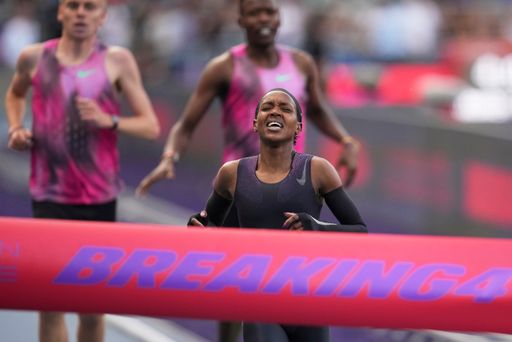When the Danish author Karen Blixen opened her memoir Out of Africa with the immortal line, "I had a farm in Africa, at the foot of the Ngong Hills", she introduced the world to a Kenya frozen in colonial amber.
That sepia-toned portrait, immortalised by Hollywood and embellished in imagination, tells only a fraction of Kenya's story.
Today's Kenya would astonish Blixen, who wrote under the pseudonym Isak Dinesen.
This is a nation that routinely produces track-and-field Olympic champions and world record-holders, which gave the world the mobile phone-based money transfer platform M-Pesa, and where Silicon Savannah is rapidly emerging as a tech hub, fostering innovation and startups.
Now, picture a pride of lions within sight of gleaming office towers in the capital city of Nairobi, or giraffes crossing the road 20 minutes away from town, and you have a backdrop as unique as can be.
Welcome to modern Kenya, a place that defies every expectation, then shrugs it off and calls it Tuesday.
Stunning contrasts
Spanning approximately 580,000 square kilometers, Kenya ranks among Africa's medium-sized countries by landmass.
Within these borders lies a world of breathtaking diversity. From Mount Kenya's snow-capped peaks to the palm-lined beaches of the coast, from the famous Maasai Mara plains to the flamingo-dotted lakes, the landscape captivates at every turn.
But picture-perfect landscapes tell only part of the story. More than 50 million people call Kenya home, representing over 40 ethnic communities who speak about 60 languages and dialects that include English and Swahili.
These include the Maasai and Samburu, whose pastoralist lifestyle and striking traditional attire mark them out as the East African nation's cultural face.
"We believe that culture is the one thing we need to embrace; we need to love it," Joshua Ole Kaputa, a Maasai festival organiser, tells TRT Afrika. "When you come into this country and you don't see a Maasai, you haven't visited Kenya. So, I am saying, Kenya is Maasai and Maasai is Kenya."
Sporting heritage
Kenya's long-distance runners have carved their names into Olympic history, their journeys beginning on dusty village paths and ending on international tracks.
The legendary Kipchoge Keino pioneered this legacy, stunning the world in the 1960s and 70s with Olympic gold medals that inspired generations.
Eliud Kipchoge, often hailed as the greatest marathoner of all time, made history in 2019 by becoming the first human to run a marathon in under two hours in simulated conditions.
"In Kenya, we say you, 'Don't chase two rabbits at a time, you will miss all of them'," quips Kipchoge. "We have a lot of talented athletes. The first step is to dare, to think, to break, secondly is to dare to do it. So, if all the people who dare to train do it, and do it, I have shown them the way."

Nature's bounty
The same highlands that produce champions also house some of the world's natural wonders, including the Great Wildebeest Migration in the Maasai Mara that draws millions of visitors year after year.
"I have seen migrations so many times, but it never gets boring," says tour operator Maggie Reya. "It's something spectacular; we keep coming and it's new every day."
Tourist Hashmita Shah gasps at the thought of her trip to the wilds of Kenya. "If they say that there are seven wonders in the world, I would say this would be the first wonder," she tells TRT Afrika. "I have visited many countries, but have never had this kind of experience in the wild."
Land and innovation
Kenya is among the world's largest exporters of tea and cut flowers, and one of Africa's leading suppliers of coffee, horticulture produce and livestock products.
According to the United Nations Food and Agriculture Organisation (FAO), agriculture contributes over 30% to Kenya's GDP.
The nation's ports also play a significant role in powering the economy alongside technology.
Kenya remains one of Africa's most influential nations politically, economically and diplomatically. The country serves as a regional hub, a peace negotiator, and a home to central UN offices.
Nairobi ranks among the continent's fastest-growing cities and the only capital city in the world with a national park that is a stone's throw from the central business district. Nairobi National Park hosts the world's Big Five – lions, elephants, rhinos, buffaloes and leopards.
Path to progress
Kenya's contemporary journey began with the Mau Mau insurgency of the 1950s, which led to the country gaining independence from Britain in 1963.
Founding President Jomo Kenyatta, one of Africa's foremost leaders, set the tone for the country to reclaim its identity before Daniel arap Moi took over. The latter's 24-year rule under a de facto one-party state ended when pressure from citizens forced the return of multi-party democracy in the 1990s.
Since then, the baton has passed from Mwai Kibaki and Uhuru Kenyatta to the incumbent, William Ruto, who was elected as the country's fifth President in 2022.
Challenges remain, but the nation has soldiered on, with President Ruto often saying the people and the government must make sacrifices as the country looks ahead to the achieving better social, economic and political development.
So far, Kenya's fundamental strengths endure: its stunning natural beauty, its athletic excellence and its economic dynamism.



















